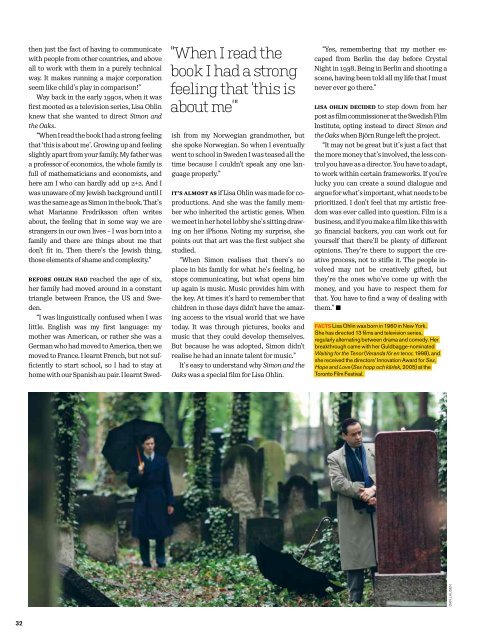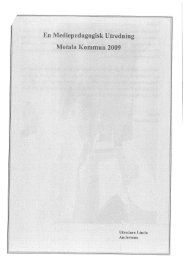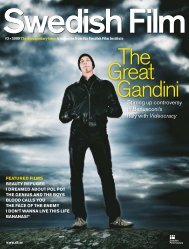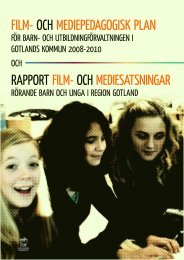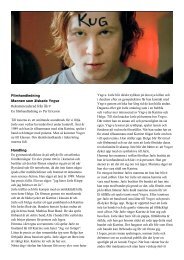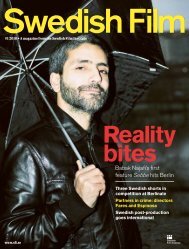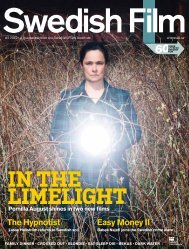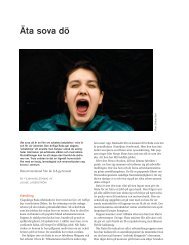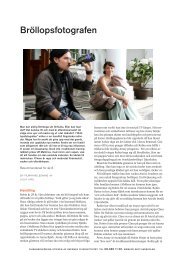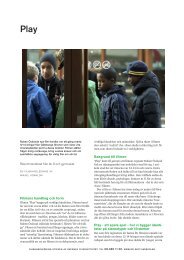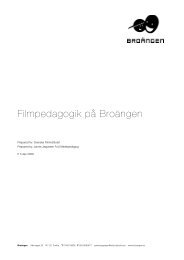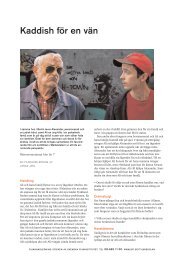Babes and booze - Swedish Film Institute
Babes and booze - Swedish Film Institute
Babes and booze - Swedish Film Institute
You also want an ePaper? Increase the reach of your titles
YUMPU automatically turns print PDFs into web optimized ePapers that Google loves.
32<br />
then just the fact of having to communicate<br />
with people from other countries, <strong>and</strong> above<br />
all to work with them in a purely technical<br />
way. It makes running a major corporation<br />
seem like child’s play in comparison!”<br />
Way back in the early 1990s, when it was<br />
first mooted as a television series, Lisa Ohlin<br />
knew that she wanted to direct Simon <strong>and</strong><br />
the Oaks.<br />
“When I read the book I had a strong feeling<br />
that ‘this is about me’. Growing up <strong>and</strong> feeling<br />
slightly apart from your family. My father was<br />
a professor of economics, the whole family is<br />
full of mathematicians <strong>and</strong> economists, <strong>and</strong><br />
here am I who can hardly add up 2+2. And I<br />
was unaware of my Jewish background until I<br />
was the same age as Simon in the book. That’s<br />
what Marianne Fredriksson often writes<br />
about, the feeling that in some way we are<br />
strangers in our own lives – I was born into a<br />
family <strong>and</strong> there are things about me that<br />
don’t fit in. Then there’s the Jewish thing,<br />
those elements of shame <strong>and</strong> complexity.”<br />
before ohlin had reached the age of six,<br />
her family had moved around in a constant<br />
triangle between France, the US <strong>and</strong> Sweden.<br />
“I was linguistically confused when I was<br />
little. English was my first language: my<br />
mother was American, or rather she was a<br />
German who had moved to America, then we<br />
moved to France. I learnt French, but not sufficiently<br />
to start school, so I had to stay at<br />
home with our Spanish au pair. I learnt Swed-<br />
“when I read the<br />
book I had a strong<br />
feeling that ‘this is<br />
about me’”<br />
ish from my Norwegian gr<strong>and</strong>mother, but<br />
she spoke Norwegian. So when I eventually<br />
went to school in Sweden I was teased all the<br />
time because I couldn’t speak any one language<br />
properly.”<br />
iT’S almoST aS if Lisa Ohlin was made for coproductions.<br />
And she was the family member<br />
who inherited the artistic genes. When<br />
we meet in her hotel lobby she’s sitting drawing<br />
on her iPhone. Noting my surprise, she<br />
points out that art was the first subject she<br />
studied.<br />
“When Simon realises that there’s no<br />
place in his family for what he’s feeling, he<br />
stops communicating, but what opens him<br />
up again is music. Music provides him with<br />
the key. At times it’s hard to remember that<br />
children in those days didn’t have the amazing<br />
access to the visual world that we have<br />
today. It was through pictures, books <strong>and</strong><br />
music that they could develop themselves.<br />
But because he was adopted, Simon didn’t<br />
realise he had an innate talent for music.”<br />
It’s easy to underst<strong>and</strong> why Simon <strong>and</strong> the<br />
Oaks was a special film for Lisa Ohlin.<br />
“Yes, remembering that my mother escaped<br />
from Berlin the day before Crystal<br />
Night in 1938. Being in Berlin <strong>and</strong> shooting a<br />
scene, having been told all my life that I must<br />
never ever go there.”<br />
liSa ohlin decided to step down from her<br />
post as film commissioner at the <strong>Swedish</strong> <strong>Film</strong><br />
<strong>Institute</strong>, opting instead to direct Simon <strong>and</strong><br />
the Oaks when Björn Runge left the project.<br />
“It may not be great but it’s just a fact that<br />
the more money that’s involved, the less control<br />
you have as a director. You have to adapt,<br />
to work within certain frameworks. If you’re<br />
lucky you can create a sound dialogue <strong>and</strong><br />
argue for what’s important, what needs to be<br />
prioritized. I don’t feel that my artistic freedom<br />
was ever called into question. <strong>Film</strong> is a<br />
business, <strong>and</strong> if you make a film like this with<br />
30 financial backers, you can work out for<br />
yourself that there’ll be plenty of different<br />
opinions. They’re there to support the creative<br />
process, not to stifle it. The people involved<br />
may not be creatively gifted, but<br />
they’re the ones who’ve come up with the<br />
money, <strong>and</strong> you have to respect them for<br />
that. You have to find a way of dealing with<br />
them.” n<br />
FaCts lisa ohlin was born in 1960 in New york.<br />
she has directed 13 films <strong>and</strong> television series,<br />
regularly alternating between drama <strong>and</strong> comedy. her<br />
breakthrough came with her guldbagge-nominated<br />
Waiting for the Tenor (Ver<strong>and</strong>a för en tenor, 1998), <strong>and</strong><br />
she received the directors’ innovation Award for Sex,<br />
Hope <strong>and</strong> Love (Sex hopp och kärlek, 2005) at the<br />
toronto <strong>Film</strong> Festival.<br />
DAN LAUSEN


